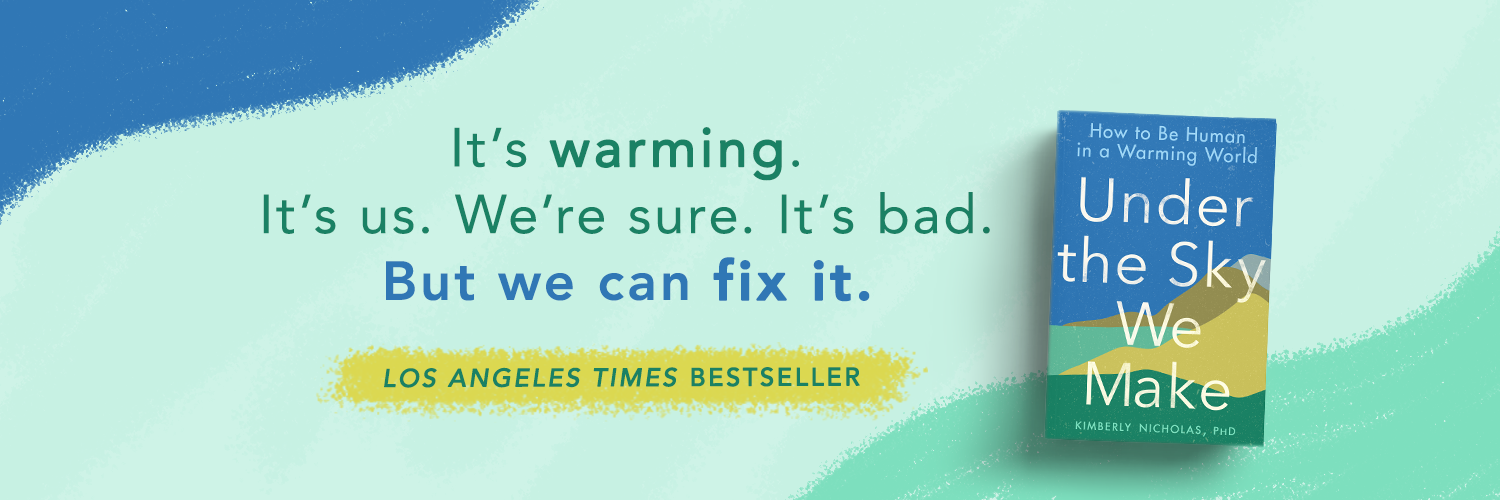Host a Book Seminar
I'm happy to join groups such as university and high school classes, research and business groups, clubs, and organizations for a seminar on UNDER THE SKY WE MAKE. This is a more intimate and engaging format than a lecture, and more tailored to the particular interests of the group due to its interactive nature.
The format I recommend is 30 minutes in discussion with a conversation partner (a group member who has read the book), followed by 30 minutes of Q&A from the audience. I've gotten very positive feedback from seminars in this format in discussion with colleagues at NYU, UCLA, Stockholm Resilience Centre, Researchers Desk, Exeter, and several departments at Lund University.
The conversation partner may select questions from the suggestions below, or ask whatever they like, as they will have the best sense of which aspects are of greatest interest to their particular group.
You might also be interested to look over the suggested discussion questions for readers, and the Q&A in the Press Kit.
You can also invite me to join your book club, or request me as a speaker for a formal lecture.
Thanks!
The format I recommend is 30 minutes in discussion with a conversation partner (a group member who has read the book), followed by 30 minutes of Q&A from the audience. I've gotten very positive feedback from seminars in this format in discussion with colleagues at NYU, UCLA, Stockholm Resilience Centre, Researchers Desk, Exeter, and several departments at Lund University.
The conversation partner may select questions from the suggestions below, or ask whatever they like, as they will have the best sense of which aspects are of greatest interest to their particular group.
You might also be interested to look over the suggested discussion questions for readers, and the Q&A in the Press Kit.
You can also invite me to join your book club, or request me as a speaker for a formal lecture.
Thanks!
Potential book interview questions
- Tell us about the book.
- Why did you write this book? Why did you pick this format, what inspired you, what's the goal of the book?
- What got you into studying, researching, and writing about sustainability?
- Why is it important for a scientist to write a book like this?
- How have you experienced climate and ecological grief?
- What are the five stages of radical climate acceptance, and how can readers navigate them? What would you say to people who are stuck in the avoidance or doom phases?
- What is climate privilege and why does it matter? How does fighting climate change look different for people with more vs. less financial resources?
- How have you personally made some of the changes you write about, and what has that experience been like?
- Many people see sustainability as a trade-off with profit. You had some really great insights on how wealthy people should take on the "individual action burden" that we see in the sustainability movement. Can you expand more on this, and how fighting climate change looks for people with more vs. less financial resources?
- What is your family history in agriculture, and how did that influence this book?
- What does the title mean?
- Did anything surprise you in writing this book?
- What do you hope readers take away from this book?
- What do you tell distraught students who come to you with worries about damage to seagrasses, coral reefs, or the other ecosystems that they hoped to study?
- You argue that one key to stabilizing the climate will be a change in mindset—a shift away from what you call the “exploitation mindset.” What is that, and what has that meant, for you personally?
- Do you think the scientific community has done a good job helping people move from climate despair to action?
- How has your thinking on environmental justice and intersectionality evolved over time? As a white woman and a climate expert, how do you see your role in the movement?
- What are your thoughts on making the climate movement more accessible?
- Why did you spend so much of your book focused on what individuals can do to decrease their carbon footprint even though we will ultimately require massive policy changes to get to zero emissions?
- What are some of the differences in approach to climate change you noticed when you moved from California to Sweden? What can the rest of the world learn from Sweden? What ideas should the U.S. be replicating?
- Other than Under the Sky We Make, what are some of your favorite tools and resources for fighting climate change? What are you reading?
- Are you hopeful?
- Any advice for people who are new to the fight against climate change or aren't sure what their place is?
- How do you stay inspired?

